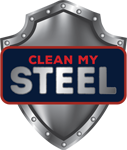Why Stainless Steel Matters
Posted by Eric Goldman on
Stainless steel is a versatile and ubiquitous material that has become a staple in many industries, from construction to medicine, and even to our everyday kitchen appliances. It is widely used due to its durability, strength, and resistance to corrosion. However, despite its many benefits, stainless steel can develop rust under certain conditions. In this blog, we will explore why stainless steel matters and the factors that can cause it to rust.
Why Stainless Steel Matters
Stainless steel is an alloy of iron, chromium, and other metals, such as nickel and molybdenum, that provide strength, durability, and resistance to corrosion. It is used in many applications, such as kitchen utensils, cutlery, medical devices, construction, and transportation. Stainless steel is also easy to clean and maintain, making it a popular choice for both commercial and domestic use.
One of the most important properties of stainless steel is its corrosion resistance. The chromium content in stainless steel forms a thin layer of oxide on its surface, known as the passive layer, which prevents the steel from rusting. The passive layer is self-repairing and can withstand exposure to water, air, and other corrosive elements.
Stainless steel is also known for its strength and durability. It can withstand high temperatures and pressure, making it ideal for applications that require toughness and reliability. In addition, stainless steel is easy to form, weld, and fabricate, making it a versatile material for many manufacturing processes.
Stainless steel is also a hygienic material that is easy to clean and sterilize. It is used in the food and medical industries due to its non-reactive and non-toxic properties. Stainless steel is also resistant to bacteria and other pathogens, making it a popular choice for hospital equipment, surgical instruments, and food processing equipment.
The Advantages of Stainless Steel
Stainless steel has many advantages over other materials, including:
-
Corrosion Resistance: Stainless steel is highly resistant to corrosion, making it an ideal material for outdoor applications or environments with high humidity or corrosive elements.
-
Strength and Durability: Stainless steel is a strong and durable material that can withstand high temperatures, pressure, and wear and tear.
-
Aesthetic Appeal: Stainless steel has a modern and sleek appearance that is popular in contemporary designs.
-
Low Maintenance: Stainless steel is easy to clean and maintain, making it a cost-effective material for many applications.
-
Hygienic Properties: Stainless steel is a non-reactive, non-toxic, and bacteria-resistant material that is widely used in the food and medical industries.
Factors that Cause Stainless Steel to Rust
Despite its many benefits, stainless steel can rust under certain conditions. The most common causes of rust on stainless steel include:
-
Exposure to Chlorides: Stainless steel can rust when exposed to chlorides, such as saltwater, chlorine bleach, and cleaning agents that contain chlorides. Chlorides can break down the passive layer on stainless steel, leading to corrosion.
-
Lack of Oxygen: Stainless steel can rust when deprived of oxygen. This can occur in environments with stagnant water, such as pipes or tanks that are not properly flushed or drained.
-
Surface Contamination: Stainless steel can rust when its surface is contaminated with iron particles or other corrosive materials. This can occur during the manufacturing process or when stainless steel comes into contact with other metals, such as carbon steel or cast iron.
-
High Temperatures: Stainless steel can rust when exposed to high temperatures, such as during welding or heat treatment. This can cause the passive layer to break down, leading to corrosion.
Preventing Rust on Stainless Steel
To prevent rust on stainless steel, it is important to understand the factors that can cause corrosion and take steps to mitigate them.
Share this post
- 0 comment
- Tags: best stainless steel cleaner, best stainless steel rust remover, clean my stainless steel, clean stainless steel, Stainless Steel Protection, Stainless Steel Rust Protection, stainless steel rust remover
